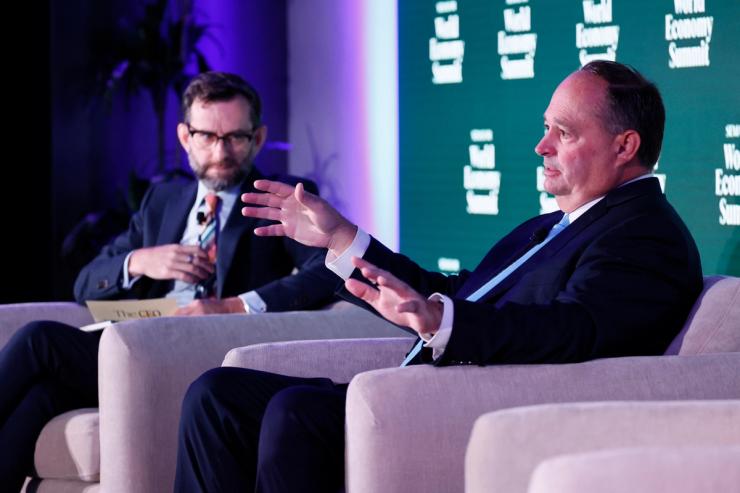The Scoop
John Hancock plans to offer health benefits, including discounted early cancer detection tests, to its 3.3 million retirement plan customers, as the life insurer and asset manager warns that Americans are insufficiently prepared for lengthening lifespans.
The US arm of Canada’s Manulife Financial has been offering customers of its life insurance business incentives such as discounts on fruit, vegetables, and Apple Watches for the past 10 years. It argues that encouraging healthier behavior will help clients live longer, allowing it to make more from investing their premiums.
Extending such benefits to 401(k) plan customers would be a first for the retirement industry, John Hancock CEO Brooks Tingle told Semafor’s World Economy Summit on Wednesday. Among the perks are lower-cost access to GRAIL’s Galleri test, which claims to be able to screen for dozens of cancers from a blood sample, and discounts on fitness tracking products from Garmin.
The announcement came as John Hancock and the MIT AgeLab published an index of Americans’ “longevity preparedness,” assessing factors from financial resources to access to community support. The index, informed by a 1,300-person survey, found that most US adults are particularly underprepared to fund or arrange the care they are likely to need, with few knowing who will look after them as they age.
“Americans generally are not particularly well prepared to live longer, healthier, better lives, to age on their terms, to thrive in older age,” Tingle told Semafor in advance of the event. “Our objective was to broaden the aperture on what living well longer looks like. It’s not just: ‘Have I saved enough?’ And it’s not even just: ‘Am I healthy?’ It’s: ‘Will I have friends? Will I be able to do things?’”
Know More
The incentives John Hancock has offered under its Vitality program for the past decade have helped reposition life insurance as a benefit policyholders can use while they are alive, “not just something that aids your heirs when you’re dead,” Tingle said. Similarly, he added, a healthier population’s need to save more to fund longer retirements could offer a commercial “virtuous circle” for companies like his.
While 75% of Americans want to work post-retirement age, just 30% are able to, Tingle said at Semafor’s summit. “This notion of people just sort of checking out at 65, we can’t afford that as a society.”
The US Census Bureau estimates that the US population aged 65 or over will expand from 58 million to 82 million by 2050, but rising lifespans have not been matched by better “healthspans.” John Hancock cited studies that suggest that, globally, one-fifth of the average individual’s life will be spent in ill health, while four in ten people now face financial instability as they age.
Financial services companies “have a tremendous opportunity [and] an obligation, to be engaging their customers and trying to improve outcomes,” Tingle said prior to the event. “Health insurers and employers will offer wellness programs, [but] people switch employers and health plans. We have these customers for decades, and we have this unique ability to monetize better, long-term health outcomes.”
“While health and wealth security are key, between those two vital bookends are the routines and assumptions that make up daily life,” Dr. Joe Coughlin, founder and director of the MIT AgeLab, said in a statement. The longevity study is meant “to spark public awareness and action to prepare people for living what is likely to be a full one-third of their adult lives,” he added.
Tingle also called for changes to the federal government’s Supplemental Nutrition Assistance Program, known as SNAP. Low-income families should be incentivized to buy fruits and vegetables rather than “junk” under the program, he argued onstage. Health secretary Robert F. Kennedy Jr. has called for barring people from buying candy and soda with SNAP dollars, Tingle noted, “but I can assure you the easiest way for me to want a soda is to tell me I can’t buy one.”
Notable
- John Hancock’s push into preventative “nudges” stemmed from Tingle’s realization that he was in a business where “nobody got any joy from our products,” he told Semafor earlier this year.
- Cancer detected early is more likely to be treated successfully, the American Cancer Society notes, but “multi-cancer detection” tests such as Galleri have not yet received formal regulatory approval, and most are not covered by US health insurers.



